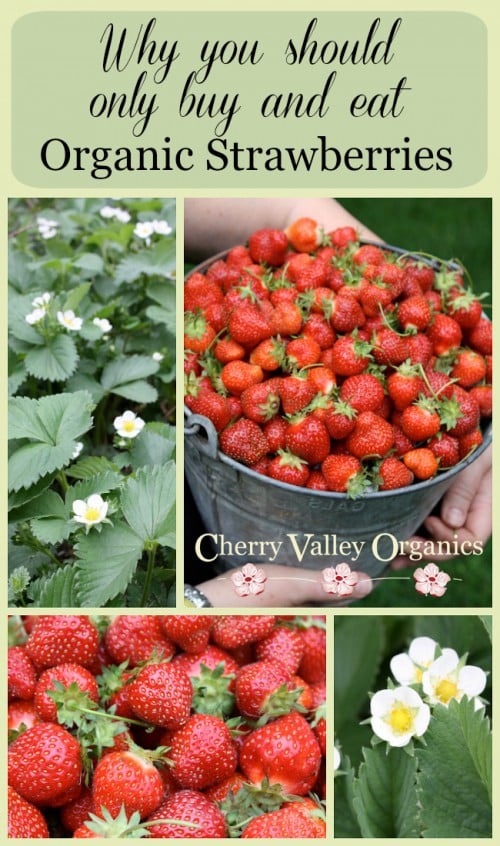What is the "Dirty Dozen" list?
The "Dirty Dozen" list is created annually by the Environmental Working Group (EWG), an organization of policymakers, scientists, and researchers who analyze data from the U.S. Department of Agriculture and rank foods based on how much residue remains after the produce is washed. Also included in this year's list are spinach, celery, pears, and sweet bell peppers, among others.

To limit your exposure to and consumption of the pesticide residues found on the "Dirty Dozen" crops, the EWG suggests consumers always buy organic. Our organic strawberries are grown without synthetic chemical fertilizers, pesticides, herbicides, or fungicides and will help limit your family's exposure to these products.
Why Our Organic Strawberries are Better for You and the Environment
Strawberries are susceptible to several different fungal pathogens, some of which reside in the soil. To combat these pathogens, conventional farmers often use chemicals to fumigate the soil to kill the spores prior to planting, but the process also harms beneficial soil microbes and soil-dwelling insects. It "sanitizes" soil in a very destructive way. One of the chemicals used to fumigate strawberry fields for decades is so dangerous to human health and the environment that it's been banned by the EPA, while others remain in active use. In addition to soil fumigants, conventionally grown strawberries are also treated with various fungicidal sprays, pesticides, and herbicides to limit pest and weed competition throughout their growth cycle, making it easy to see why strawberries find their way onto the "Dirty Dozen" list.
Organic strawberries like ours, however, rely on a mixture of cultural practices to manage disease, pest, and weed issues. We take growing organic strawberries very seriously, and to our knowledge, we're the only USDA Certified Organic producer of strawberries in western Pennsylvania. We're very proud of that!

How We Grow Organic Strawberries
We start growing our organic strawberries just like we grow all the crops here on our farm: from the ground up. We use organic composts and other amendments to naturally build the health of our soil and suppress disease. Healthy plants show improved disease resistance, and healthy plants grow from healthy soil.
Next, we carefully choose each of the strawberry varieties we grow. We select varieties known for their vigor, production, hardiness, and flavor. We don't settle for the cheapest starter plants we can find; instead, we choose the best starter plants we can find. Right now, our strawberry field is full of June-bearing varieties hand-selected and planted by Farmer Tim, and we expect to have berries ready for harvest from June through mid-July, depending on weather conditions.

After carefully choosing the right varieties, we pay close attention to the planting process, being sure to give each plant plenty of room to grow. Because fungal diseases thrive in areas where air circulation is poor, properly spacing strawberry plants is key to suppressing disease. We don't cram the plants in too tightly in hopes of maximizing our yield like some conventional farms do; instead we give each plant all the room it needs.
Next, our patch of organic strawberries is well mulched with straw. The straw not only serves to hold in soil moisture, limit weed growth, and stabilize the soil temperature throughout the growing season, it also forms a protective barrier over the soil. This barrier restricts disease spores from moving out of the soil and splashing up onto the fruits during rainy weather. Plus, it keeps the ripening fruit off the ground where slugs and other pests can easily access it.
The Power of Pollinators in Organic Strawberry Production
Another negative impact of conventional strawberry farming is the effects of all of those synthetic chemicals on pollinators. Bees are the primary pollinators of strawberries, and big conventional strawberry farms sometimes don't have enough bees around to pollinate their strawberry crop. So instead of relying on a healthy population of indigenous bees, they truck in European honeybee hives and put them in the fields temporarily in order to pollinate their strawberry crops.
Here at Cherry Valley Organics, we have an incredible diversity of pollinators on the farm. Because we don't use any of the synthetic chemical pesticides that can sometimes affect pollinator health, our bees are more than happy to beautifully pollinate our strawberries. All the annual and perennial flowers we have around for our cut flower bouquets help boost pollinator numbers, too!

How Can You Get Our Organic Strawberries?
If you want to enjoy part of our organic strawberry crop this year, be sure to sign up for our Pittsburgh CSA Farm Share Program where they'll be one of the seasonal items offered to our subscribers. For $25.00 per week, you'll get a box of organic produce grown right here on our farm and hand-selected just for your family. We have pick-up sites all over the Pittsburgh region.
We'll also be selling limited quantities of our organic strawberries to customers at the Sewickley Farmers Market when they're in season. Come see Allie on Saturdays from 9-1 in the parking lot at St. James Church. She'd love to tell you more about or organic growing practices!
Eat Healthy, Eat Local, Eat Organic!
Want to learn more about the organic produce we grow? Check out these related articles:From, The Cherry Valley Organics Farm Family

